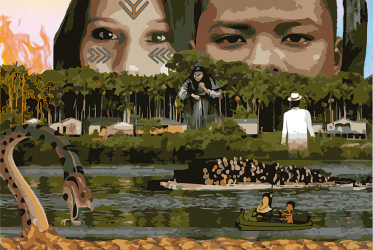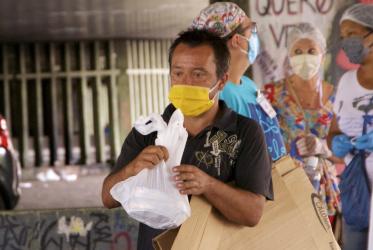Iglesia Evangélica de Confesión Luterana en el Brasil
(Igreja Evangélica de Confissão Luterana no Brasil, IECLB)
The first German immigrants arrived in Brazil in 1824, bringing with them their Evangelical faith. The settlement in Sao Leopoldo became the German Protestant stronghold and the base for progressive expansion. Later, similar colonization projects attracted German immigrants to the neighbouring states in the north, up to Espiritu Santo, giving rise to many Protestant congregations as well as hundreds of parish schools. The first permanent general church body was the synod of Rio Grande do Sul in 1886. Other states followed. The present church was inaugurated as a federation of synods in 1949. At first restricted to the ethnic and cultural German community, IECLB members integrated themselves in Brazilian society more quickly after World War II. At its general council meeting at Sao Paulo in 1968 the four synods of partly Lutheran, partly United and Reformed traditions merged into a nationwide church with a central administration, with various regions. In 1998 the IECLB approved a new structure based on 18 synods. In 2000, six advisory groups to the presidency were set up, for theology and confessionality, mission, ecumenism, public responsibility, gender and ethnicity.
Among the three schools of theology, the Escola Superior de Teologia (EST) in Sao Leopoldo has been a privileged space for ecumenical reflection, practice and exchange, both on national and international levels, especially through the Ecumenical Institute for Graduate Studies. The school always has teachers and students from other churches. It has chairs on ecumenism, and feminist theology. Women of the IECLB - 1,346 organized groups - have played a leading role in congregational life, and presently they are also more and more committed to themes related to the Decade to Overcome Violence against Women. About one third of the pastors are women. The WCC Justice, Peace and Integrity of Creation programme has been the background of several annual themes of the IECLB that have dealt with social responsibility, justice and peace, agrarian reform, indigenous people, mission in urban and rural contexts. The diaconal activities, coordinated by the department for diakonia and the Lutheran Foundation for Diakonia, are developed on all levels within the WCC spirit of diakonia and solidarity. In recent years (since 2000) the IECLB has been developing an encompassing plan of missionary action, which is partially related to texts and programmes of mission and evangelism of the WCC. The church runs 57 parochial schools, 21 hospitals, 48 social centres, 21 retreat centres and four publishing houses.
The IECLB has bilateral dialogues with the Catholic Church, the Episcopal Anglican Church of Brazil and the Evangelical Lutheran Church of Brazil. The theme of koinonia (and communion) has had significant repercussions in the dialogue with the Catholic Church and other churches that have an ecumenical spirit.
Priorities and challenges include: confessional unity in the context of religious pluralism; the public responsibility of the IECLB within Brazilian society; dialogue with internal evangelical, charismatic movements, as well as with the PPL-Pastoral Popular Luterana (representing mainly liberation theology); themes related to faith and money, grace and gratitude, stewardship, proportional contributing, financial autonomy on all levels; human sexuality and ministry; HIV/AIDS.





